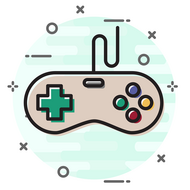(View Complete Item Description)
Welcome to the URF Academy, a free resource for educators who seek to encourage and inspire the next generation of game designers.
Our Game Design Curriculum is our way to share our love for and knowledge of games to students everywhere. We designed it with accessibility top of mind—any teacher with access to the internet and a printer should be able to teach students how to design a fun game.
In our six-module curriculum, we outline the principles of game design using a simple framework and explore concepts through engaging workshops and activities. Students will learn about the language and theory necessary to engage deeply with games and ultimately collaborate in groups to design a paper prototype of a multiplayer game.
History: In 2016, a group of Rioters launched URF Academy, an interactive game design workshop for high school students at our headquarters in Los Angeles. URF Academy’s goals were to teach local students about fundamental concepts in game design and showcase the breadth of careers in the gaming industry.
After hosting more than 500 students over the course of two years, we expanded URF to several regional offices, including St. Louis, Dublin, Sydney, São Paulo, and Mexico City. Simultaneously, we began co-developing a free, online curriculum with two veteran computer science and game design educators to empower teachers to provide high quality game design instruction to high school students around the world.
Material Type:
Activity/Lab,
Assessment,
Curriculum Map,
Game,
Homework/Assignment,
Interactive,
Learning Task,
Lesson,
Lesson Plan,
Module,
Other,
Self Assessment,
Student Guide,
Unit of Study
Authors:
Alicia Morris,
Amanda Jeffrey,
Blake Edwards,
Brian Chui,
Chris Reed,
Dan Nabel,
Erika Haas,
Gabby Cherney,
Jeffrey C. Burrell,
Jessica Martincic,
Jimmy Hahn,
Joanne Lin,
Jocelyn Monahan,
Jordan Schmidt,
Kathleen Mercury,
Matthew Leung-Harrison,
Mike Foster,
Nancy Se,
Riot Games,
Stone Librande,
Vishnu Kalugotla


















